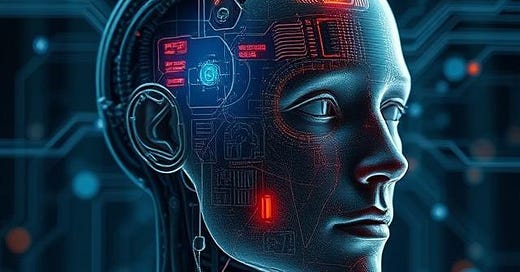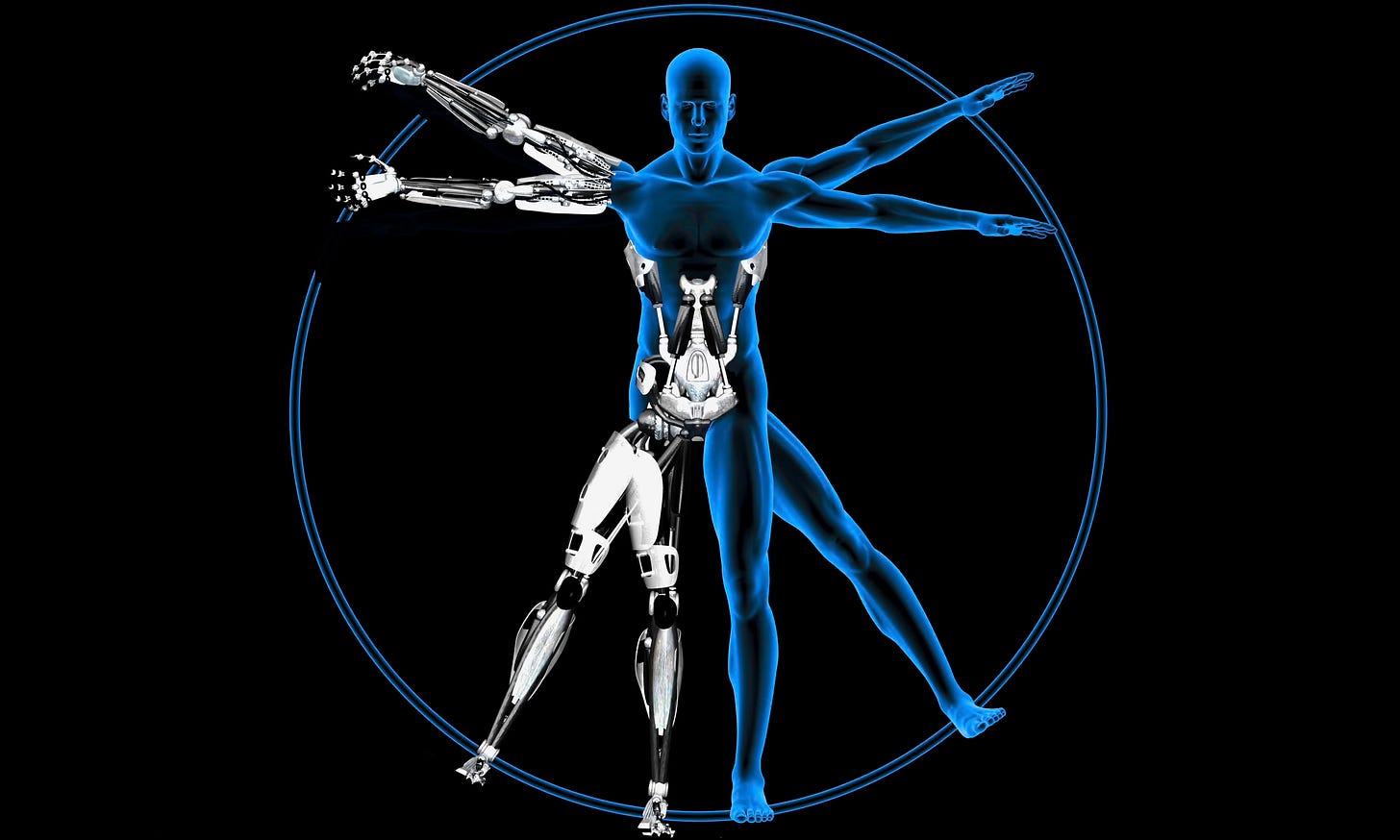If you’ve seen the Netflix documentary “Don’t Die,” you may know that multimillionaire Bryan Johnson is trying to extend his life indefinitely.
He gets 8 hours and 34 minutes of sleep every night. He doesn’t eat after 11am. When he sits—which is rare—he sits up very, very straight. He spends hours exercising in his home gym. He tracks his breaths, his movements, his heartbeats, his weight, and his BMI. He sits in front of UV light devices and wears red light cap devices on his head. He takes 60+ pills a day. He has a temperature-controlled bed and air filters to optimize air quality. He eats food that, as one guy in the documentary remarks, “tastes like nutrition.”
Bryan Johnson’s body is now 5 years younger than his biological age. He wants to see how much “younger” he can get.
The question, of course, is Why? Why would anyone sacrifice a normal, indulgent-but-enjoyable life just to live longer? Why would anyone behave that way?
His life choices are extreme, but Bryan Johnson is no different than any one of us. He does what he does because of what he believes.
Actions always stem from ideology. Radical ideology = radical actions.
Let’s back up.
An ideology is “a system of ideals.”
The word system matters here, because all our beliefs ought to hang together in a logical way. If one belief shifts, the whole rest of the system has to reckon with that shift. (Imagine an evangelical pastor with a gay son, for example. It’s not just that one branch of the ideological tree that’s upset; it’s the whole tree.)
That’s why people so rarely change their minds... it’s not worth throwing the whole system off balance.
It’s also why an interruption in one small area of life can cause a whole unraveling.
The questions at the heart of someone’s ideology have to do with how they understand humans, God, and the physical world. People operate every day with ideologies that are either unknown (as in, unarticulated at the conscious level) or borrowed (from someone more outspoken or powerful).
Those we call revolutionaries are the folks who disrupt the status quo by offering an alternate system to describe how the world operates and what things are of value.
Jesus, for example, articulated a radical ideology. He suggested an entirely new “system.”
Bryan Johnson is doing the same: suggesting a new way of thinking about human beings.
Other tech bros (like Sam Altman, who regularly publishes “manifestos”) have been articulating radical ideologies for years. Altman promises AI will deliver “massive prosperity” and other “astounding triumphs” like “fixing the climate.” Ray Kurzweil “rejects death” and openly longs for the singularity, when he predicts humans and machines will merge into one. Peter Thiel plans to freeze his body after death in hopes of eventual immortality.
We’ve all been tapping away at our phones while Silicon Valley has been serving as a church for the shared ideology that powers those phones. The tech bros have a gospel, and it is called transhumanism.
Transhumanism is the belief that humans can use tools to evolve past our current physical and mental limitations.
Technology is just the word for the tools that allow us to do that.
Maybe we speak flippantly about optimization culture (apps that help you save time and articles that tell you which is the best toaster to buy) and enhancement culture (photo filters that help you look prettier and surgeries that do that IRL).
Transhumanism posits that we can keep optimizing and keep enhancing endlessly, until humans are optimized beyond death.
It’s easy to dismiss people like Ray Kurzweil as fringe. Obtaining eternal life inside our current skin suits sounds like an abstract, pie-in-the-sky idea. Not to mention… totally undesirable?
But tranhumanism has real effects on policy. People like Musk not only dismiss constraints but are hostile to the very idea of limitations. This is Silicon Valley’s “move fast and break things” mantra—which is now, apparently, the US government’s mantra. Inside Silicon Valley, this ideology has become all tangled up with masculinity and aggression.
If you can reject limits and reject death, you can reject anything. You can reject bodies. You can reject privacy. You can reject autonomy. You can reject law. You can reject humanity.
Bryan Johnson is experimenting on his own body. His critics say he’s playing God.
I say, go for it. We’re bound to learn from his willingness to turn himself into a lab rat, and there are certainly more nefarious ways he could spend his millions of dollars.
I don’t think actually think Bryan Johnson is crazy. His actions are the logical result of his transhumanist ideology. He’s not crazy; he just has an ideology that refuses to acknowledge the concept of trade-offs.
When Johnson puts in pills, vegetables, and workouts, he gets back months of his life. For every 12 months, he ages 8 months. (He has the receipts to prove it!) In one post, he wrote that, since he’s aging at a rate less than a year in a calendar year, he gets “September, October, November, and December for free.”
But it isn’t free. He pays for those months with his hours in the red light chamber, his hours in the gym, his hourly blood draws and 8:30pm bedtime. He has chosen a mechanistic view of his body over a relational one. He has made a trade.
We are always making trades based on what we value. Bryan Johnson is correct that I can have more days to live IF I am willing to stand up and do burpees instead of writing this.
He’s not wrong. It’s just not the trade I want to make.
This is why I care about technology. There has always been an ideology at play behind our devices, and now that the inventors of our devices have both (a) billions of dollars and (b) practically unrestricted government control, the ideology of transhumanism is going to shape the whole world.
Andy Crouch writes, “Every attempt to implement machine learning will come at the cost of removing features of personhood from the world.”
What might those lost features of personhood be? Eye contact? Physical proximity? Shared communities?
Eventually, people who aren’t embarrassed by their humanity (their slowness, their fallibility, their limited memory) will be left behind. People who refuse to extend their powers much beyond what our human bodies have to offer will be considered quaint and old-fashioned. People who don’t board the bullet train to tech utopianism will be seen as ineffectual, maybe even disposable.
I don’t care a whit about your screen time. I care about your humanity.







Thank you for this
Thought provoking. I actually came to your Substack because of a note I wanted to restack (which I will do) but this caught my attention. I've read about him. It made me think about a question a college prof asked us students - did we think man or technology was going to solve the problems of the world. I sided with man, thinking there first has to be a will for things to be better. I've learned a ton from a life that beat me up so significantly that now reading this two things come to mind: One - why would anyone want to stay in this body any longer than necessary and Two - we are already part of a Singularity, we're just asleep and don't realize it. Now, I know that's not grounded in Newtonian observable science like his measurable activities, but there are other ways of knowing. I'm slowly adding them to my stack...they want to be told ;-)